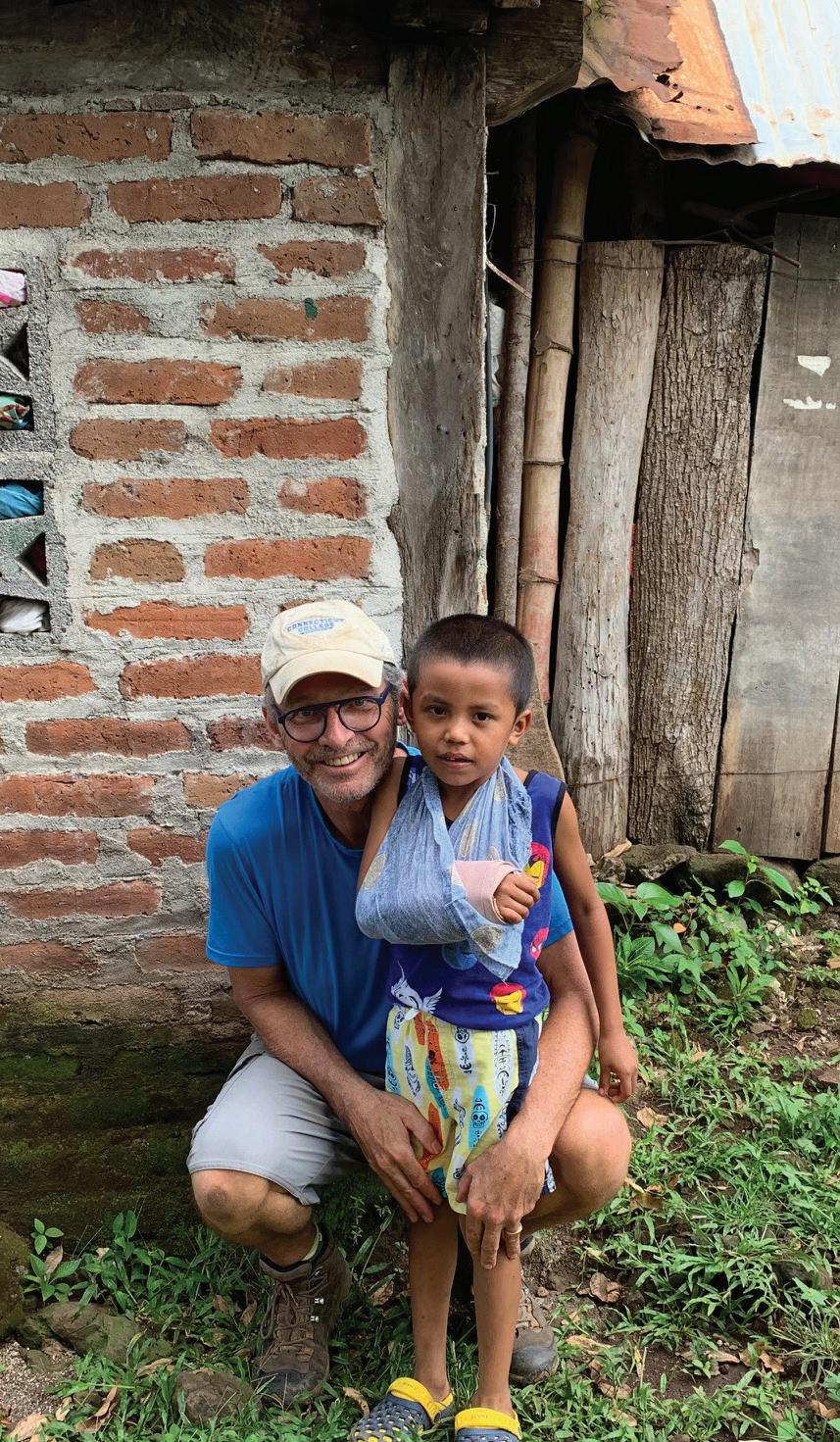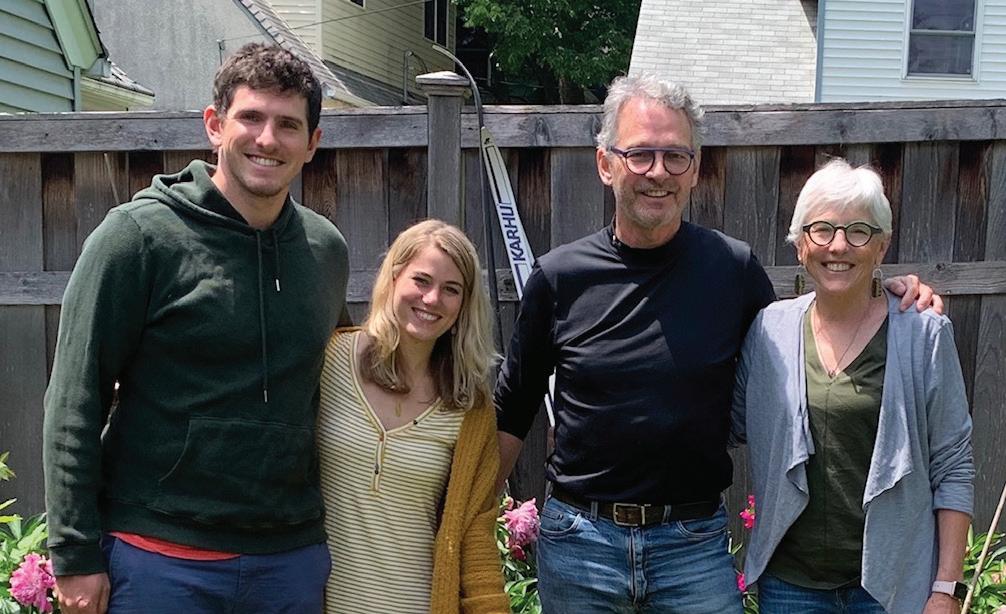
4 minute read
Serving the Underserved
DR. JEFF HANSON ’82
In the midst of a global pandemic and widespread civil unrest stemming from years of racial injustice, thinking of others is certainly on the minds of most right now. One UJ alum, Dr. Jeff Hanson (‘82), is no stranger to this type of thinking—he’s dedicated his career as a family practitioner to serving others.
Advertisement
Dr. Hanson grew up in Detroit Lakes and came to the University of Jamestown in hopes of one day becoming a doctor. He majored in Biology, while playing both football and baseball. After graduation, Dr. Hanson attended medical school at the University of Minnesota. WORKING WITH IN-NEED COMMUNITIES
Dr. Hanson knew that he wanted to serve others. During his last year of medical school, he spent time working in El Salvador, where he lived with a former Jamestown professor Dr. Stan Slade and his family. From there, he did his Family Medicine residency in an inner-city program in Minneapolis. After completing his residency, Dr. Hanson began working at developing and improving multiple community clinics in Minneapolis.
“I’ve always had a feeling that I wanted to be a part of a mission that served others,” explained Dr. Hanson. “Initially I had plans to return to Central America and help develop systems that could improve healthcare there, but my direction changed, and I worked in inner-city clinics in Minneapolis. These are clinics that serve a large population of individuals in need. I saw the disparities of the underserved.”
He continued, “These clinics were grassroots, many working with volunteers. They grew from basic clinics into full practice. One was within blocks of 38th and Chicago, where we just saw major protesting of racial injustice. One was on the West Bank which serves a large immigrant community.” HOW COVID HAS AFFECTED PATIENT CARE
Schedules and the way patients are cared for has definitely changed. Dr. Hanson spends two weeks in the clinic seeing patients and two weeks out of the clinic doing virtual/phone visits.
Working in family medicine, Dr. Hanson has known his patients for many years, some since birth.
“I feel that it’s important that I maintain that relationship,” he continued. “Knowing them, their personalities, their struggles, knowing their health situations and family situations—it’s all helpful. Virtual appointments, which I do two weeks per month due to COVID, can be draining. You just hope you aren’t missing things without being able to do an examination. But knowing my patient well is very helpful for these situations.”
Dr. Hanson explained how there’s a connection and a bond that forms from people being able to sit and talk—especially when one is trusting the other with their health needs.
“My patient population ranges from kids and newborns to my oldest patient who is 107,” he explained. “I have many patients in the COVIDhigh-risk categories with diabetes, hypertension, African American heritage and those in the older age groups. We have to find a way to care for their complicated medical needs and keep them safe in this time of COVID.”
A GLOBAL PANDEMIC
Over the past 20 years, Dr. Hanson has worked with a surgical group that goes to Guatemala. He would travel with his wife, who is a surgeon, as well as his son.
“My wife would operate. And I would do the other care, like pre- and post-surgery,” he explained. “COVID right now is exploding in South and Central America, as well as across the world. In those parts of the world, they are starting to see the effects of that dramatic rise.”
Due to this rise, his family and the group he works with have made the decision that they won’t be able to go to Guatemala this year.
“That’s an effect of COVID that a lot of people don’t realize. We can’t deliver healthcare to places that don’t have regular access to it,” explained Dr. Hanson. “There are a lot of factors that go into that decision. Either we aren’t able to enter the country. We don’t have the protective equipment needed to keep patients and ourselves safe. There won’t be the resources to be able to test for COVID.” He continued, “There’s a different culture and lifestyle in these parts of the world that is just not good for preventing COVID from spreading.”
MOVING FORWARD
Healthcare officials admit they are still learning about COVID and how to manage it. Will it be like the 1918 influenza or H1N1? Will it be a slow burn? Will there be ups and downs?
For Dr. Hanson, at least one thing is certain. “We need to make sure we are thinking about those that are around us and not just ourselves. We need to think of all the variables. How do we manage this to protect


those who are vulnerable? How do we make sure we have the resources to care for those who are sick? How do we protect essential workers, many who have already given the ultimate sacrifice, and how do we manage this so businesses can survive?”
This is a strange and complicated time with COVID and the concerns for social justice.
Having built a career around working in underserved communities, Dr. Hanson has thoughtful, yet extremely doable advice for others, explaining that the idea comes from Kareem Abdul-Jabbar, who recently spoke about the need for understanding in the times we are in.
“Knowing that injustices have been going on for years, I just encourage people to get to know someone who is not like themselves,” he continued. “You don’t realize how much you don’t know about someone—how they may have been treated in our community—if you don’t ask. We need to listen. If we don’t get the chance to know people who are not like ourselves, we can never be better.”




